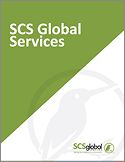

什么是农场可持续性评估?
通过农场可持续发展评估(FSA)计划的验证,促进您的食品公司或农场在可持续发展方面取得进展。FSA 计划由 SAI Platform(一个致力于在食品供应链中推进可持续农业发展的食品行业组织)制定。FSA 用于评估农场的可持续发展水平,促进农场持续改进,支持可持续供应链目标,并为现有标准、规范、计划和立法设定基准。FSA 计划在 60 多个国家使用,有 19 种语言版本,适用于各种农产品成分。评估适用于供应链区域或国家内的单个农场或所有农场。SAI 平台提供对 FSA 工具的访问,以支持食品公司评估其在特定供应链中的管理系统和可持续采购目标,并在三个绩效等级中获得认可。
"科学认证体系公司“ 偶然?
食品公司越来越多地寻求经第三方验证的食品安全标准合规性保证。这一点,再加上独立验证者可以带来的可持续发展专业知识和观点,是种植者、整合商和品牌选择第三方验证的部分原因。作为可持续农业认证的先驱之一,SCS拥有您所寻找的丰富经验和专业资格。我们的审核员遍布全球,对农业运作进行评估。此外,SCS被认可在SAI平台和FSA工具的基准下进行广泛的项目认证,允许捆绑服务的潜力。SCS将协助评估现有的操作,制定目标,并实施负责任的供应链措施 - 在世界任何地方。
- 计划细节
- 过程
- 标杆管理和捆绑管理
- 常见问题
- 文件
SAI Platform 于 2014 年创建了 FSA,以评估农场可持续发展水平并为现有标准设定基准。该工具在 60 多个国家使用,有 19 种语言版本,适用于各种食品和饮料农业配料。
食品公司- SAI 平台提供对 FSA 工具的访问,以支持食品公司实现其可持续采购目标。 SCS将协助您评估现有业务、设定目标,并在全球任何地方实施负责任的供应链措施。
农场 --在三个绩效等级中的一个等级下获得认可,基于你对基本、基础和高级标准的符合程度。
- 铜牌:良好农业实践的坚实基础。100%覆盖基本要素,75%覆盖基本要素。
- 银色。可持续农业实践得到领先公司的认可。100%覆盖精华部分,80%覆盖基础部分,50%覆盖高级部分。
- 黄金。卓越的耕作方法。100%覆盖基本内容,100%覆盖基础内容,75%覆盖高级内容。
金融服务管理局核查审计分为两个部分:
- FSA 管理体系审核 - 包括 28 个控制点
- 农场核查审核 - 核查农场填写的自我评估问卷 (SAQ) 的答案,包括 109 个问题
SCS也被认可根据这些FSA基准的标准和行为准则进行认证。
- Bonsucro 生产
- GLOBALG.A.P.
- ISCC
- RSB
- RSPO
什么是 SAI 平台?
SAI 平台是一个食品和饮料行业组织,致力于在食物链中推广可持续农业。它创建了农场可持续发展评估(FSA)工具,用于评估农场的可持续发展水平。
FSA 审计从开始到结束需要多长时间?
完成审核的时间取决于您的业务规模和复杂程度。通常情况下,整个过程可在几周到几个月内完成
什么是 FSA?
FSA(农场可持续发展评估)是一个高效的新工具,它为您--全球食品和饮料价值链上的公司--提供了一个评估可持续发展实践的单一、简单的工具,帮助您采购越来越多的可持续发展农产品。这是一个免费的多用途参考工具,您可以用它来衡量自己公司的规范和/或第三方认证计划,甚至是国家/地区的具体立法。如果没有标准,它还可以用作自我评估,并向供应链传达您的期望。许多全球品牌,如可口可乐、联合利华、麦凯恩和蒙代尔等,已经采用了 FSA,并用它来评估和衡量可持续农业实践。
我为什么要考虑使用它?
现在,您无需评估和验证多个农场的可持续发展实践,也无需对现有计划进行基准测试,有史以来第一次,您只需使用一种工具即可完成这项工作,从而节省了时间和资源。
我们真的需要新的标准或新的自我评估方式吗?
FSA 并非旨在取代现有的、公认的基准标准。许多 SAI 平台成员已经在使用 FSA 比较和评估现有标准,如 Red Tractor、Rainforest Alliance、Skylark 和 ISCC 等。
但 FSA 能为公司带来什么真正的好处呢?
简而言之,FSA 可帮助您节省时间和资源,避免对农民的可持续发展实践进行多重评估。例如,可口可乐和联合利华正在使用 FSA 在欧洲采购可持续甜菜。与许多公司一样,它们也有自己的供应商可持续发展规范,但它们正在使用 FSA 与供应商沟通期望。因此,制糖公司(SAI 平台成员公司及其他公司)现在正积极向多个客户宣传其 FSA 表现水平。因此,FSA 正在帮助协调各方的期望,并推动可持续发展供应链中的所有相关方采取行动。
使用 FSA 如何有助于在实地产生可衡量的影响?
在许多方面。虽然 FSA 不能衡量减少的温室气体排放或节水等影响,但它关注的是应该产生这些影响(并且可以衡量)的做法。FSA 还可用作改进计划的基础,从而产生(可衡量的)影响。
除了可能节省时间和资源外,FSA 是否还有其他好处?
是的。它还为您提供了与供应商和生产商接触的重要途径,并为制定改进计划奠定了基础。FSA 还可用于确定特定供应链和/或地区的潜在风险主题(热点或趋势),在某些情况下,它还能消除评估和验证工作中经常看不到的重复现象。
FSA 是否意味着我们需要停止使用其他规范、标准和基准?
FSA 是一项自愿性工具,SAI 平台成员可根据自身具体需求使用 FSA。一些公司在其所有供应链中使用,而其他公司则选择在一两个供应链中使用。其他成员则选择完全不使用。FSA 并不是要引入更多标准,也不是要迫使任何公司放弃对其有效的做法。FSA 的目的是创造一种通用的、统一的语言,鼓励供应链上下游自愿共享有关可持续发展实践的信息,以促进各方加强合作,改进实践。
谁是 FSA 的幕后推手?
SAI 平台开发 FSA 是为了满足业界对一套统一要求的需求,并将平台的原则和实践转化为实用的实施工具。SAI 平台是一个非营利组织,拥有来自食品供应链的 75 名成员,旨在推动全球的可持续农业实践。
FSA 是否得到食品行业以外人士的支持并被视为可信?
FSA 的制定听取了行业内外专家的意见,其中包括主要非政府组织、大学、农民及其代表团体的代表。我们利用他们的建议和意见,并以公认的现有标准和计划为基础,制定了 FSA。我们还在世界各地进行了试点测试。因此,作为评估可持续农业实践的新工具,它既可信又具有互补性。
服务手册


